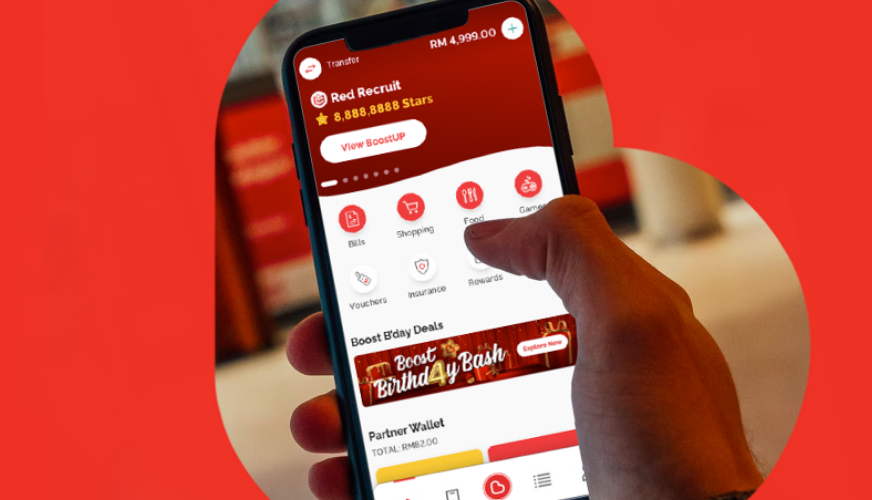
Boost is planning a regional expansion. (Source – Boost)
Boost fintech to go full-spectrum, to expand regionally
Axiata’s fintech arm, Boost, is aiming to go full-spectrum as a financial services provider, with a goal to expand throughout South and Southeast Asia, leapfrogging off Indonesia as a key growth market and further expanding its services in Malaysia.
Boost, which already has a presence in the region through its partnerships with various local telco players, will be focusing on upping its game in the Buy-Now-Pay-Later (BNPL) segment and enabling SMEs in the digital economy moving forward.
This would also allow the e-wallet player to grab a slice of the growing digital opportunities in Southeast Asia, where there has been a user growth of 60 million new digital customers in the digital economy since the pandemic started, especially with fintech identified as one of the leading sectors in the internet economy.
Boost fintech for serving the underserved
Moving forward, Boost will be prioritizing the expansion of its BNPL products in 2022, claiming it is in a unique position to dominate this space in Malaysia, already having the basic tenets to build the business. This includes a large active consumer base, an expansive merchant network, settlement and payment infrastructure, and best in class digital underwriting and collection capabilities.
The company will also be expanding its B2B platforms with a goal to enable SMEs to participate more broadly in the digital economy. Boost recently launched a food delivery platform called Boost Makan and is working on launching a platform for SMEs to source raw materials at competitive rates. Focus will also be placed on enhancing the functionalities and capabilities of its merchant app to enable merchants to leverage analytics and insights to scale their business.

Sheyantha Abeykoon, CEO of Boost (Source – Boost)
Boost Credit, the lending arm of Boost, is also a partner with names like GHL, Lazada, and FoodPanda, offering micro-financing solutions such as working capital, supply chain financing and invoice financing, along with micro-insurance products to MSMEs.
“From our earliest days in 2017, our mission was to serve the underserved segments’ inclusion through scalable technology platforms. We have built our capabilities over the past four years that strengthens our ability to meet the financial requirements of consumers and small businesses.”
“Today, our fintech business is operated by five different entities, making us one of the few fintech companies to operate a payment, lending, merchant solutions and cross border remittance platform at scale in Malaysia,” said Sheyantha Abeykoon, CEO of Boost, during a media briefing yesterday.
Growing financial services
The growth in users in the digital economy was also reflected in Boost’s Malaysian user- and merchant-base growth. By the end of 2021, its user base grew to over 9.6 million, with the merchant base nearly doubling to over 438,000 merchant touchpoints.
As it stands, according to the e-Conomy SEA 2021 report, one in three SMEs in the Southeast Asian region believed they would not have survived the COVID-19 pandemic had it not been for digital platforms.
The report also outlined that digital financial services, especially lending, will continue to flourish tremendously until 2025. Boost’s regional loan book grew by 48% from 2020 to 2021 with a 31% growth momentum expected until 2025.
This is an area that Boost has firm plans to continue focusing growth. Last year alone, Boost Credit’s loan book in Malaysia and Indonesia grew healthily with a total Gross Transaction Value (GTV) of loans disbursed increasing by about 13 times and 55 times respectively from 2020 to 2021.
Additionally, non-performing loan ratios from both Malaysia and Indonesia remained at single digits at below 3% and below 1% respectively, despite a challenging past two years. With that, Boost Credit earned a preliminary A1 stable and sustainable rating by RAM Ratings.
Regional scaling and digital banking
Also shared is that Boost has been partnering and acquiring telcos in the region to scale its business across the region. An example is Indonesia’s KIMO, where the e-wallet player saw Boost Indonesia growing 5 times year-on-year through the pandemic to disburse upwards of IDR 250 billion per month, making it one of the largest P2P operations in all of Indonesia.
Other partners include Smart Cambodia, where the group’s cross-border arm Boost Connect launched a storefront to tap into the smart game voucher market there.
In Malaysia, Boost also seeks a digital banking license, with parent company Axiata forming a 60-40 consortium with RHB to apply for said license from the nation’s sovereign bank. To further fuel its Digital Bank aspirations, Boost became the first digital banking license hopeful to sign a Memorandum of Understanding with Credit Guarantee Corporation Malaysia Berhad for a potential digital bank guarantee.
READ MORE
- Strategies for Democratizing GenAI
- The criticality of endpoint management in cybersecurity and operations
- Ethical AI: The renewed importance of safeguarding data and customer privacy in Generative AI applications
- How Japan balances AI-driven opportunities with cybersecurity needs
- Deploying SASE: Benchmarking your approach


